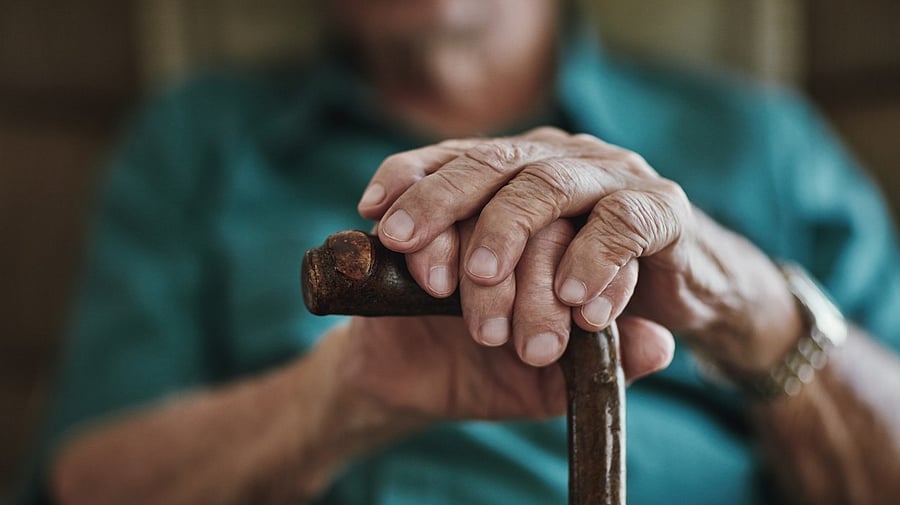
Photo of a man leaning on his walking stick.
Photo for representational purpose.
Credit: iStock photo
Kerala has taken a pioneering step by becoming the first Indian state to establish a dedicated commission for senior citizens.
This landmark move, formalised under the Kerala Senior Citizens Commission Act, 2025, marks a crucial shift from viewing the elderly as a societal burden to recognising them as a demographic deserving of specific legal and institutional protection.
The commission is a proactive and empathetic response to the growing challenges faced by older people.
India’s population is ageing at an unprecedented rate, a result of improved healthcare and increased life expectancy. The number of people aged over 60 has risen dramatically, and projections suggest that by 2050, one in every five Indians will be a senior citizen. This demographic transformation, however, has not been met with adequate social support systems, leaving a vulnerable generation at risk.
Globally, nations such as Japan and Sweden have successfully tackled this challenge through community-based integrated care and robust government-funded social welfare. In Japan, a mandatory long-term care insurance system provides extensive services based on need, not income, with a focus on home-based care. Sweden’s model treats elderly care as a social right, funded by taxes and managed by municipalities to ensure universal home help and specialised housing based on individual needs. Both systems prioritise dignity and independence for the elderly, demonstrating integrated, needs-based care.
As traditional joint family structures give way to nuclear families, the elderly often find themselves isolated and vulnerable. The emotional and financial neglect they experience is no longer an exception but a widespread concern.
The recurring cases of abuse and assault of senior citizens illustrate a broader, national crisis. This is a largely underreported but widespread problem that robs senior citizens of their dignity and security. As people age, their diminished capacity to care for themselves makes them vulnerable to various forms of abuse and neglect. Financial abuse is particularly common, with elders often targeted by scams. Many cases go unreported, often occurring within a domestic setting by family members. Cases have been reported where retired individuals are left destitute after sacrificing their property for their children, only to be abandoned. Many elders endure silent suffering and are subjected to constant humiliation and social isolation.
Such incidents underscore the urgent need for a legal framework to protect the elderly from abuse and provide them with a formal avenue for legal recourse.
The new commission in Kerala aims to be a comprehensive and transformative solution. Its mandate goes beyond simply resolving disputes; it’s designed to be a holistic body that protects the rights of senior citizens from all forms of abuse. The commission provides legal assistance in property disputes and offers real-world solutions to the daily challenges they face. This proactive approach ensures a formal avenue for legal recourse against abuse and neglect.
Ensuring social justice
The commission will also play a crucial role in shaping policy, encouraging the active use of the wisdom of the elderly for the benefit of society, and raising awareness among families about their responsibilities. This initiative is particularly significant for women, who often bear the brunt of ageing with limited income and support. The commission’s focus on welfare and rehabilitation is a vital step towards ensuring these women can age with dignity and security.
At the community level, local support groups and volunteer networks can enhance the commission’s efforts, providing grassroots assistance and combating social isolation.
Indian court rulings, primarily guided by the Maintenance and Welfare of Parents and Senior Citizens Act, 2007, have established a strong legal framework to protect their rights. The judiciary has repeatedly affirmed the right of senior citizens to reclaim property transferred to their children if the latter fail to provide basic care. Courts have also been empowered to order the eviction of abusive family members from an elder’s property. These rulings reflect a commitment to social justice, ensuring that senior citizens can live with dignity and have a speedy and effective remedy against neglect.
There is an imperative need for those in the higher echelons of power to prioritise the rights and well-being of the older citizens. Such an initiative is not merely a social obligation but a strategic necessity for a nation that aims to thrive by leveraging the experience and wisdom of all its citizens. This progressive move should pave the way for a more comprehensive, compassionate, and robust public policy on elderly care across the country, ensuring that ageing is a journey of dignity, not a burden.
(The author is an independent writer)